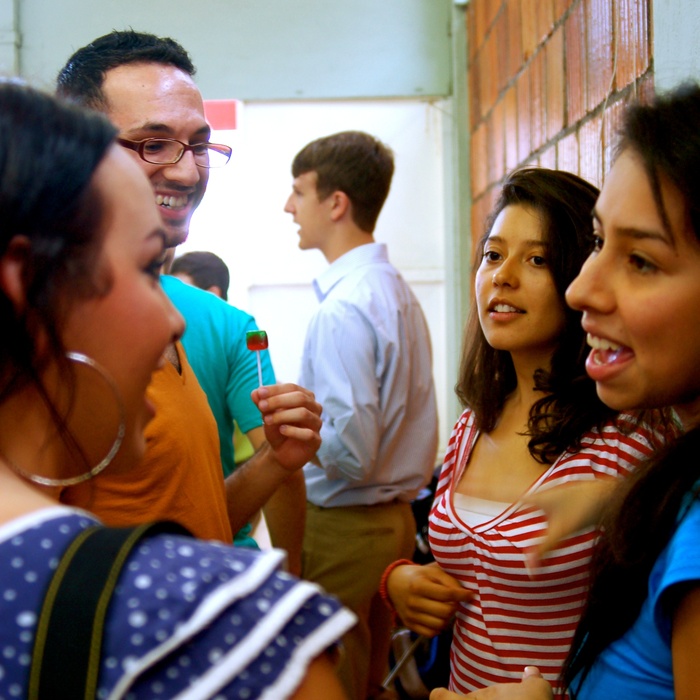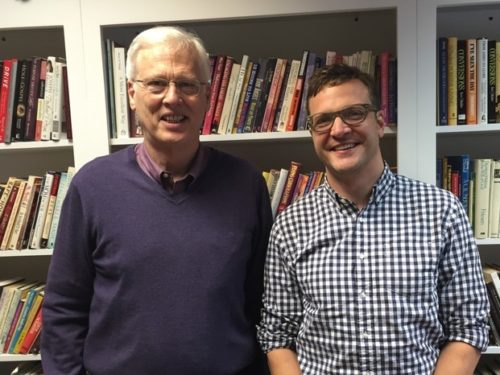 Leadership
Leadership
Passing on a piece of wisdom. Bob Munger was a deeply loved mentor for many curr...
 Leadership
Leadership
By: ECO Team
Before my role as assistant to the Synod Executive at ECO, I spent three years as a missionary to college students on the Central Coast of California with InterVarsity Christian Fellowship. In my short years working with this group of people I learned a lot (and failed a lot) about how to reach the 19.5 million college students that are in universities across the nation. If you are reading that number and thinking “Wow, that’s a ton of people!” and also thinking “We need to reach those students!!” let me offer you a few pointers that I learned during my time on campus.
Seriously, go on campus and hang out there; in the university center, at the library, on the lawn, or wherever there are college students: go there because honestly, they probably won’t be coming to you. Students are busy with classes, jobs, and clubs. These activities take up their time and they usually don’t have cars. So getting to you becomes less of a priority.
Now pause, look at your self in the mirror, do you look like you are still in college? Probably not. That’s ok. Neither did I, but I went to campus anyways because God called me to reach college students. I found students who wanted to pursue Jesus and cared about reaching their peers for the purposes of the Kingdom of God and I hung out with them. Met their friends, went to the dorms with them, ate with them on campus, started up spiritual conversations with them by my side in the University Center and it became less weird.
If you want to develop college ministry, invite doubt into the picture, because students have questions and they grapple with doubt all the time! Sadly, many hold the perspective that the church isn’t a welcoming space for people with doubt.
I met Andrew his freshman year. He was passionate about biology and loved Jesus. Then he began experiencing doubts about the validity of Christ and his faith. He began to isolate himself in his doubts, just what the enemy wants us to do. When he shared his “terrifying doubts” with me, I listened and shared my own painful experiences with doubt and admitted that it is still a struggle for me as well. I think that we sometimes want to wipe the doubt away with smiles and great verses on perseverance. That doesn’t bode well for the college population.
They are in college to seek truth and answers. When we deny them the journey of doubt, which I believe is a process that God delights in; we extract them from the process of finding their own personal relationship with Christ, which denies them authentic faith.
We can sense when there is a lack of authenticity and we run from it. College students are hungry for belonging, especially belonging to an authentic community that loves them well and wrestles with them through life’s struggles. Create a culture in your ministry that is comfortable sitting in the uncomfortable — that doesn’t deny pain, but embraces it with open arms.
In your own ministry capabilities you can probably impact about 10 students’ lives each year. But if you train 10 students to see their peers with a Kingdom view, share the story of how Jesus impacted their lives, learn how to call their friends to learn more about Him, and finally challenge them to invite 10 more students to do the same, you might just reach 19.5 million students.
We are often tempted to take those amazing students who show fantastic leadership potential and “plug them in” to our church ministries. This is fine if you need a few more volunteers for children’s ministry and tech support on Sunday’s. But if you want to impact an entire generation of people, find out what those missional leaders love to do, and send them to go do it.
Cast vision for how their passions can be used for the Kingdom of God and send them to go make disciples in the places where they already have influence (clubs, dorms, sports teams ect). It’s exactly what Jesus did. Think about the demon possessed man in Mark 5. Jesus doesn’t ask the man to come with Him, instead he sends him back to the people in Decapolis with a powerful story about how The Son of God changed his life forever. Imagine what could happen at our universities if we released more students into this type of ministry?
Working with college students is difficult. I failed a lot. But what if I hadn’t even tried at all? Who would have met Andrew in his crisis of faith? These students are in a crucial juncture of their lives. Let us pray about and consider how we can best meet them where they are and challenge them to do more with their lives right now for the sake of the Kingdom.
 Leadership
Leadership
Passing on a piece of wisdom. Bob Munger was a deeply loved mentor for many curr...
 Leadership
Leadership
Developing spiritual leaders at the Elder Leadership Institute How can a triad o...
 Leadership
Leadership
What makes a missional leader? This past Sunday, our church gathered together to...